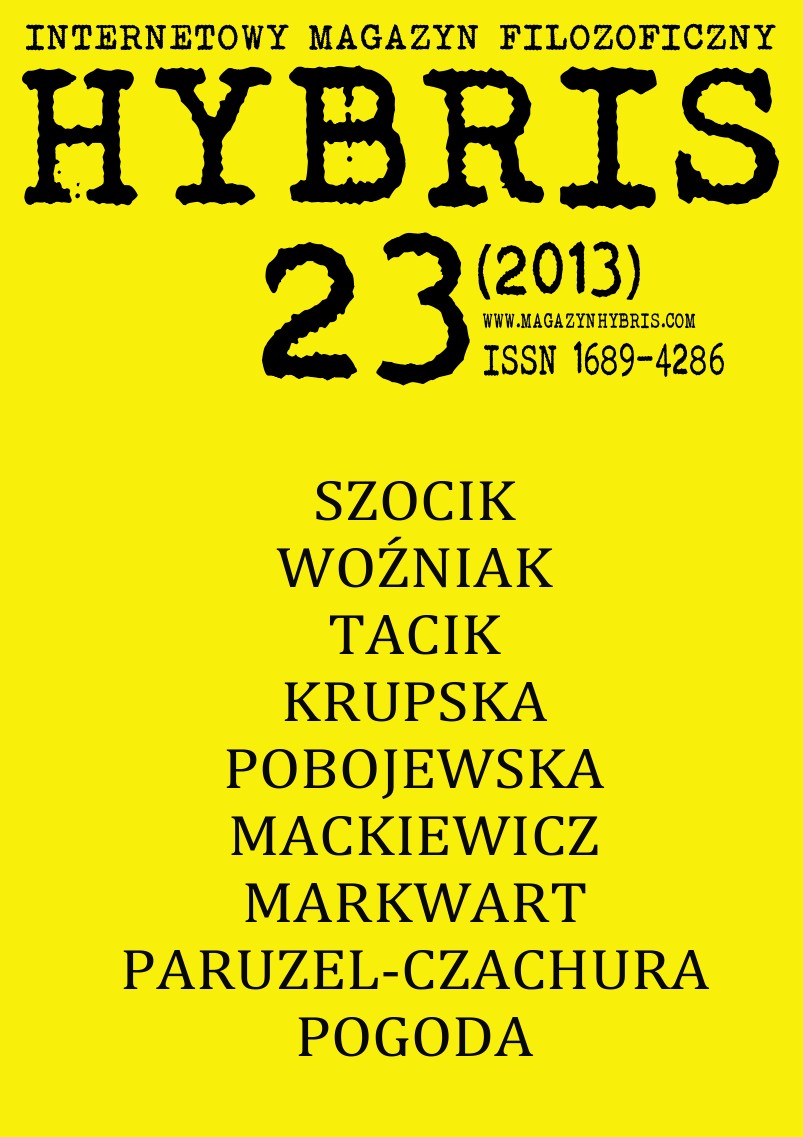Praca jako narzędzie kary i poprawy w myśli Michela Foucaulta
DOI:
https://doi.org/10.18778/1689-4286.23.07Abstrakt
The article focuses on the problem of work in context of the thought of Michel Foucault. Initially an issue of the ambiguous character of work is addressed, mostly in context of Veblen’s and Dahrendorf’s theories. Work, from this perspective, may be, on the one hand, valuated highly, treated as a privilege and act as a tool of correction and self-development. On the other hand, lack of work can be either stigmatising (leading even to social exclusion) or being a sign of a high social status. In the latter case work is regarded as a toil and burden.
Michel Foucault discussed work in context of the facilities of internment, both those that were to serve the disadvantaged people (poor, sick, mentally ill) and those that are the places of incarceration. In the great breakthrough of the 17th and 18th century many institutions and laws were, according to Foucault, designed with regard to utility. Therefore work became the tool for correction and normalisation as well as for punishment, a way to shorten the sentence, interned people were supposed to help the society, to repay for either their crimes or for the society’s help. Homo penalis was considered in terms of homo oeconomicus.
The article discusses the issue of work in Foucault’s thought placing it in context of the incarceration, internment, utility and relations of power and knowledge.
Bibliografia
Boullant, F., 2003, Michel Foucault et les prisons, Paryż: Presses Universitaires de France.
Zobacz w Google Scholar
DOI: https://doi.org/10.3917/puf.boull.2003.01
Dahrendorf, R,. 1993, Nowoczesny konflikt społeczny: esej o polityce i wolności, przeł. S. Bratkowski, W. Niepokólczycki i inni, Warszawa: Czytelnik.
Zobacz w Google Scholar
Foucault, M., 1987, Historia szaleństwa w dobie klasycyzmu, przeł. H. Kęszycka, Warszawa: Państwowy Instytut Wydawniczy.
Zobacz w Google Scholar
Foucault, M., 1994, wywiad przeprowadzony przez: G. Tarrab, Michel Foucault, l’illégalisme et l’art de punir, [w:] Dits et écrits 1954-1988, seria wydawnicza Gallimard, t. III (1976–1979).
Zobacz w Google Scholar
DOI: https://doi.org/10.14375/NP.9782070739882
Foucault, M., 2009, Nadzorować i karać. Narodziny więzienia, przeł. T. Komendant, Warszawa: Aletheia.
Zobacz w Google Scholar
Foucault, M., 2011, Narodziny biopolityki, przeł. Michał Herer, Warszawa: PWN.
Zobacz w Google Scholar
Hobbes, T., 2009, Lewiatan, przeł. C. Znamierowski, Warszawa: Aletheia.
Zobacz w Google Scholar
La Capra, D., 2006, Relire « l’histoire de la folie », [w:] “Revue d’histoire moderne et contemporaine (1954–?)”, t. 53, Nr 1 (2006).
Zobacz w Google Scholar
DOI: https://doi.org/10.3917/rhmc.531.0007
Locke, J., 1992, Dwa traktaty o rządzie, przeł. Z. Rau, Warszawa: PWN.
Zobacz w Google Scholar
Markwart, A., 2010, Kara — sprawiedliwa i…?, [w:] Materiały Krakowskiej Konferencji Młodych Uczonych 2010, Kraków: Fundacja dla AGH i Grupa Naukowa Pro Futuro.
Zobacz w Google Scholar
Nozick, R., 1999, Anarchy. State. Utopia, Cambridge & Oxford: Blackwell.
Zobacz w Google Scholar
Paternek, M., A., 1987, Norms and Normalization: Michel Foucault’s Overextended Panoptic Machine, [w:] „Human Studies”, t. 10, Nr 1 (1987).
Zobacz w Google Scholar
DOI: https://doi.org/10.1007/BF00142988
Rau, Z., 2010, Umowa społeczna w doktrynie Johna Locke’a, [w:] Z. Rau, M. Chmieliński (red.), Umowa społeczna i jej krytycy w myśli politycznej i prawnej, Warszawa: Wydawnictwo Naukowe Scholar.
Zobacz w Google Scholar
Rousseau, J., J., 2002, Umowa społeczna, przeł. A. Peretiatkowicz, Kęty: Antyk.
Zobacz w Google Scholar
Seigel, J., 1990, Avoiding the Subject: A Foucaultian Itinerary, [w:] “Journal of the History of Ideas”, t. 51, Nr 2 (1990).
Zobacz w Google Scholar
DOI: https://doi.org/10.2307/2709516
Skąpska, G., 1996, Prawo i społeczeństwo, Warszawa: Interart.
Zobacz w Google Scholar
Smith, A., 2007, Badania nad naturą i przyczynami bogactwa narodów, t. II, ks. V, przeł. B. Jasińska, Warszawa: PWN.
Zobacz w Google Scholar
Turner, J., H., 2010, Struktura teorii socjologicznej, przeł. G. Woroniecka, J. Szmatka i inni, Warszawa: PWN.
Zobacz w Google Scholar
Veblen, T., 2008, Teoria klasy próżniaczej, przeł. J. Frentzel-Zagórska, Warszawa: Wydawnictwo Literackie MUZA.
Zobacz w Google Scholar
Warylewski, J., 2007, Kara. Podstawy filozoficzne i historyczne, Gdańsk: Wydawnictwo Uniwersytetu Gdańskiego.
Zobacz w Google Scholar
Zoll, A., 2009, Polityka karna w kontekście obowiązku poszanowania godności osoby karnej, [w:] J. Utrat-Milecki (red.), Kara w nauce i kulturze, Warszawa: Wydawnictwo Uniwersytetu Warszawskiego.
Zobacz w Google Scholar
Pobrania
Opublikowane
Jak cytować
Numer
Dział
Licencja

Utwór dostępny jest na licencji Creative Commons Uznanie autorstwa – Użycie niekomercyjne – Bez utworów zależnych 4.0 Międzynarodowe.






